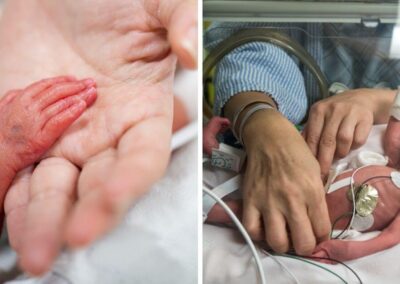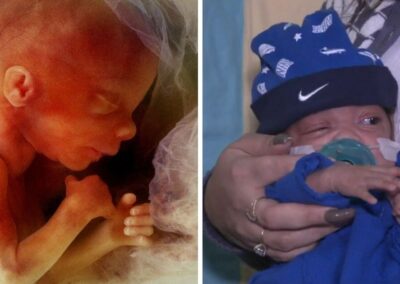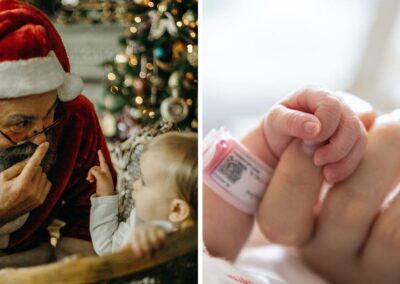A baby girl, nicknamed “Little Pea”, has been discharged from hospital after being born at 24 weeks and three days. The premature baby weighed only 550 grams at birth, and measured just 30 centimetres in height.
She was born at the Affiliated Renhe Hospital of China Three Gorges University in Yichang and has been hailed as the lightest premature baby to be successfully treated in the city.
“Little Pea” was discharged in time for Christmas having reached over 5 times her birth weight and measuring 48 centimetres. Reports say that she is heading home in good health following a challenging four months in the Neonatal Intensive Care Unit (NICU).
Hospital’s lightest baby to be successfully treated
When “Little Pea” was born over three months early, the news outlet China Daily reported that her legs were as thin as an adult’s little finger and her skin as fragile as an insect’s wings.
The little girl was unable to breathe by herself when she was born, but doctors immediately intervened and were able to ventilate her and save her life. After a month in the NICU, she was able to breathe with non-invasive support and reached the huge milestone of weighing one kilogram.
A further three months of tireless, round-the-clock support from the team at the hospital saw “Little Pea” gain another 1.8 kilograms, allowing her to be discharged from the hospital. “Little Pea”, nicknamed by the staff who cared for her, made the remarkable journey home, becoming the lightest premature baby successfully treated in Yichang.
Her mother said “We are grateful to the doctors and nurses, without whom we wouldn’t be here with our baby in good health”.
Survival rate for extremely premature babies doubles
The survival rate for extremely premature babies like “Little Pea” is improving all the time. In the decade to 2019 alone, the survival rate for extremely premature babies doubled, prompting new guidance from the British Association of Perinatal Medicine (BAPM) that enables doctors to intervene to save premature babies from 22 weeks gestation. The previous clinical guidance, drafted in 2008, set the standard that babies who were born before 23 weeks gestation should not be resuscitated.
Once a mother is over 22 weeks pregnant, if her baby is born prematurely, the chances of survival increase week-by-week due to technical advances, better planning so pregnant mothers who go into preterm labour go straight to specialist units, and the increased use of steroids.
Research published in November 2023 by academics at the University of Leicester and Imperial College London found the number of babies born at 22 weeks gestation who survive to discharge from hospital tripled between 2018-19, before the BAPM guidance was introduced, and 2020-21, after the BAPM guidance was introduced.
According to this research, there were a total of 261 babies born alive at 22 and 23 weeks, before the UK abortion limit, who survived to discharge from hospital in 2020 and 2021. This is compared to the Government abortion statistics, which show that in 2021 alone, there were 1,054 abortions for babies at 22 and 23 weeks gestation.
Spokesperson for Right To Life UK, Catherine Robinson, said “Congratulations to Little Pea for making it home in time for Christmas and to the staff who cared for her so well. It is amazing to see how tiny premature babies are surviving earlier and earlier. Stories like this remind us of how precious these little lives are and provide hope that more babies born early can be saved”.












